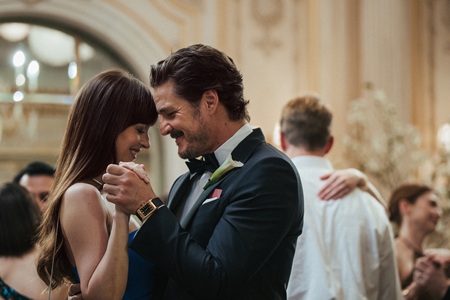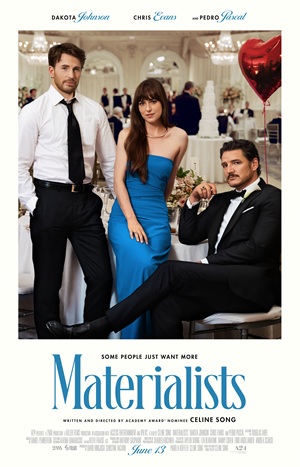
Love, Regret, and Consumerism Collide in Celine Song’s Materialists
There’s this touching moment in director Gore Verbinksi’s flawed, if still underrated, 2001 comedy-thriller The Mexican where a closeted hitman portrayed to perfection by the late James Gandolfini asks his prisoner, a winning Julia Roberts, a personal question: “When two people love each other — really love each other — but they just can’t get it together, when do you get to that point where enough is enough?” The pair have become increasingly close and, even though they know they shouldn’t, especially as the former may be ordered to kill the latter, somehow, someway, they’ve still developed a bond, one where a query like this isn’t beyond the pale.
A variation on this moment happens near the tail end of Materialists, the new drama written and directed by Past Lives Academy Award nominee Celine Song. For reasons best not spoiled here, struggling New York actor John (Chris Evans) is standing in a secluded field with his matchmaker ex Lucy (Dakota Johnson) just outside of earshot of a wedding they’ve both impromptu crashed. He delivers a pained, heartfelt monologue on the complicated dualities — some might even call them hypocrisies — of love. It’s a scene that not only reminded me of that brief bit from The Mexican, but one that also slapped me across the face and slammed a lump in my throat, forcing me to see Song’s latest in a new light.
Purely from a performance standpoint, this is the single best moment in Evans’s career. His words cut straight to the heart. They do not sugarcoat and they do not minimize. Song has crafted a speech for John that echoes into the eternal abyss of human mysteries, and Evans gives it its poetry and its soul. If it goes on a little long and is possibly a bit too on the nose, well, that’s okay. It’s the bracing authenticity of what’s being said and the question that is being asked that truly matters: When do two people who truly love one another but can’t quite get everything on the same page say enough is enough? Does that point even exist?
It’s a pity that so much of Song’s script is so belligerently cautious as sequences like this one hint at an uncompromising eloquence that sadly never fully materializes. I got the feeling that the filmmaker wanted to bust romantic comedy conventions as we’ve come to know them over the decades with her minimalist approach, but the film kept refusing to make the adventurous creative leap for that to happen.
But not for the lack of trying. The performances are rigidly austere. It was as if each actor had recently stepped off the set of a Whit Stillman’s Metropolitan or Barcelona and maintained his signature mannered approach to line delivery with their approach to their characters in this. As sublime as the score by composer Daniel Pemberton (Fly Me to the Moon) may be, there’s precious little of it in the picture itself, the majority of the drama set to nothing more than the background ambient sounds of New York itself. The visual compositions are disquietly flat, and there is a statically distinct reserve to what cinematographer Shabier Kirchner (Bull) conjures up. This gives the story a nonfictional severity reminiscent of a Barbara Kopple or Frederick Wiseman documentary.
Because of all of this the plot, a love triangle where Lucy must choose between a smoothly charming millionaire named Harry (Pedro Pascal) or her sad sack ex John who has barely two pennies to his name, generates a hard-hitting agency that would not exist if Song had gone down a more traditional genre route. The actors get room to breathe and time to make each character unique, which is impressive considering all three of their arcs follow a rudimentary template that goes all the way back to the time of Cary Grant, Katharine Hepburn, and James Stewart.
Unfortunately, this is also why the picture’s steadfast refusal to surprise audiences is so frustrating. Things predictably transpire in a manner that has all the nuance and the subtly of a data analyst checking off boxes on a spreadsheet. The shattering beauty that Song brought to Past Lives, one of the best pictures I’ve seen this decade, is oddly absent. As cute and as endearing as the climax is, there is still something about where things ended up that left me slightly underwhelmed.
Yet I keep coming back to that third-act monologue delivered by Evans. How many of us have the guts to tell those we love the unvarnished truth when everyone is at their most vulnerable? Straight, no chaser, and with no holding back? Song’s writing in this moment could have come off as hackneyed or trite, maybe even cruel. But the combination of her eloquent authenticity and the nakedly raw bravery that fuels every haunting syllable Evans utters puts it over the top. I was left gobsmacked.
Materialists may not quite gel, and its pieces do not all fit together comfortably, but I still find that I can’t stop thinking about it and treasuring so many of the story’s idiosyncratic wonders. That speaks volumes. Much like real love, true love, the love that fills the pages of comedies, dramas, tragedies, and epics spanning from Beowulf to the present, I find the missteps and mistakes to be as equally notable — and as vital — as all of the good-to-great stuff is.
So, what’s the point when enough is enough? Never. It’s never enough. That destination does not exist.
Film Rating: 3 (out of 4)








